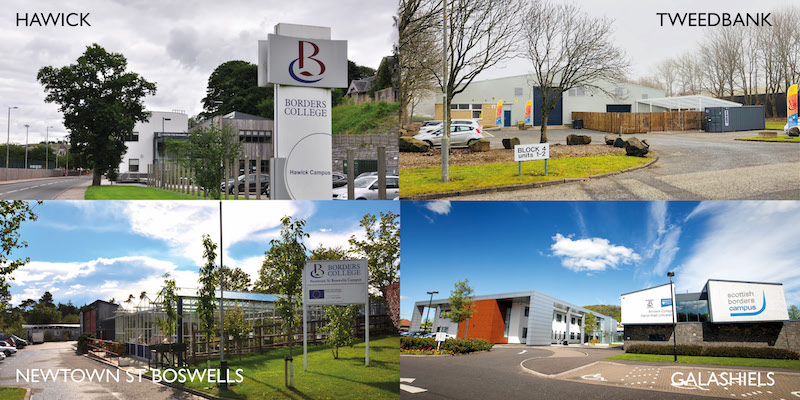Sustainable Travel Plan
This Travel Plan has been prepared in support of a drive towards Net Zero by 2040 in line with sectoral and Scottish Government targets. Transport and Travel to from and from College plays a vital role in the operation of the College and contributes approx. 11% to the College CO2 emissions annually (excluding commuting).

Draft Extract – 09/11/21.
Introduction
The aim of this Travel Plan is to meet the College Target of 50% of all College journeys to be made by public transport, walking, cycling or other sustainable transport means by 2025. The College will Deliver more sustainable travel patterns and make use of low emission travel options and procure low emissions vehicles as they become available and affordable.
To ensure the success of the Travel Plan it is considered essential that a Travel Working Group (TWG) is established to monitor the effectiveness of the plan and make key decisions and recommendations for change. The Travel working group will provide a focal point for the management of the plan initiatives and to encourage the dissemination of information to the related parties to improve travel awareness.
The Travel Plan should be a dynamic document with a continuous cycle of ‘plan monitor-review’ and should include targets as well as objectives. In response to this an Action Plan is included in Section 5 as a means of setting targets against which it will be possible to monitor the progress of the Travel Plan Initiatives.
The objectives of a Travel Plan for the purpose of education are aimed at
encouraging the use of more sustainable and integrated modes of transport, reducing car usage with a view to reducing the College impact on the environment in turn reducing the Colleges CO2 emissions, improving health, safety and wellbeing for all who attend College.
The Key objectives of the Travel Plan are considered to be as follows:
- To promote walking, cycling, public transport, and the use of multiple-occupancy vehicles, for example coaches and minibuses
- To reduce the use of cars by both staff, students and visitors by implementing a travel Policy to discourage unnecessary journeys by implementing a travel hierarchy and encouraging home working and remote learning/teaching.
- To adopt the use of low/zero emissions vehicles across the College estate.
- To ensure that the development is accessible for those with mobility impairment
The Travel Plan will be a vital component in achieving integrated and sustainable transport patterns, The successful implementation of such transport patterns can produce significant benefits for the College, its staff and students, visitors as well as for society as a whole.
Benefits to Borders College
- Demonstrating a commitment to such sustainable priorities can promote a ver
- Positive image of the institution, both internally and externally.
- Health and Wellbeing of staff/students and visitors to the College
- Reducing CO2 emissions minimising our impact on climate change for future generations
- Reducing costs associated with operating fossil fuel vehicles.
- Minimising the number of car parking spaces required at both the onsite and Public car parks could reduce costs associated with capital expenditure, Maintenance and security as well as affording the opportunity to use the land within the campus for other purposes.
Benefits to Staff and Students
- Financial benefits associated with lower travelling costs through the use of public transport etc
- Better dissemination of transport information to students and staff
- Minimised congestion for those driving to and from the campus
- Health benefits for those using walking or cycling as a means of transport to and from the campus
Benefits to Visitors
- Better dissemination of transport information to visitors
- Minimised congestion for those driving to and from the campus
Benefits to Society
- Making the campus accessible by all sections of society, therefore minimising Social exclusion.
- Improved local air quality, less noise, less traffic, less dirt and fumes by reducing car journeys.
- Reduced impacts on national and international sustainable issues such as Climate change.
To meet net Zero as a society and as organisation we must procure, promote and utilise sustainable modes of transport. It is recognised that this can only be achieved by understanding the existing transport conditions, the proper use of the existing resources and the effective dissemination of information.
The transport strategies and initiatives that will be adopted by the College are
listed below:
Management Strategies
- The College shall appoint a Travel Working Group (TWG) to manage and implement the Travel Plan initiatives for the overall development, including a continuous cycle of ‘plan-monitor-review’.
- The College shall provide support and commitment from Senior Management to the Travel Plan initiatives.
- The College will conduct travel surveys to establish/understand the travel patterns of the staff and students using the campus. The results of the surveys will be used to set targets to reduce car usage and improve sustainable means of transport.
- The College will co-operate with Heriot Watt University to make sure that the Travel Plan initiatives will benefit the students and staff of both institutions.
- The College will work closely with external stakeholders on regional travel plans including Scottish Borders Council, Border Buses and other who may have a vested interest.
Dissemination of Information:
- The College will encourage the dissemination of information to its staff, Students and visitors to raise the awareness of the consequences of their transport
- Choices, in particular the impact of car trips, and the benefits of choosing sustainable alternatives through various means. Including web site, social media and local public displays/initiatives.
- The College will provide information at appropriate locations within the Campus to cover the issues of transport access to the campus such as walking, cycling the use of public transport and parking arrangements.
- The College will provide a direct link on its web site to cover issues of transport access such as walking, cycling the use of public transport as well as onsite parking arrangements.
- The College will provide up-to-date information for bus/rail services to and from each campus and provide a link to the timetables of the bus operator and promote access to discounted travel tickets.
Walking
- The College will shall ensure that information on the pedestrian routes between the site and strategic locations within a 2-mile radius is made available via the website and social media.
Cycling
- The College will provide secure and covered cycle parking facilities in and around campus and provide shower facilities and lockers for its staff and students cycling to work.
Public Transport
- The College shall liaise with the bus/rail operators over the availability and cost of season tickets for its staff and students for use on services associated with travel to and from the college.
- Consideration shall be given to the inclusion of free public transport tickets for one-days travel to and from the campus, This would encourage new starters to try different modes of travel, which would be mutually beneficial to the College, Staff/Students and the bus/train operators.
- The College will ensure that information on public transport in the area including times, frequency, cost etc, is kept up to date and is made readily available on the website and at the campus.
Minibus Services
- The College will review its current fleet of minibuses to ensure the fleet is well maintained and is fit for purpose, the College will develop strategies to replace the current fleet with sustainable alternatives as these become available and affordable.
College Car Fleet
- The College will review its current car fleet usage and make recommendations for sustainable replacements which may include electric or hybrid alternatives.
College Grey Fleet
- The College will review current practices for the use of grey fleet mileage by current staff and make policy recommendations to significantly reduce non-essential travel by utilising technology and or by providing incentives or imposing disincentives.
Parking Arrangements
- The College will ensure that the onsite car parking spaces are limited to permit holders only, which shall include the disabled staff and students, and the staff of both Borders College and Heriot Watt University. Vehicles without a parking permit shall be parked in the public car park located to the south of the campus.
- The College shall ensure that the signings to both onsite and public car parks are located at appropriate locations and clearly direct traffic in and out of the area.
- The College will encourage its staff and students to participate in car Sharing and will explore incentives for its staff who is prepared to give up parking space, for example financial inducements.
- The College shall ensure that the parking spaces for coaches and minibuses are as near to the campus as possible to encourage these modes of transport.
- The College will develop onsite electric charging stations suitable for staff/student and public
Action Plan
|
Action required |
By When |
|
Replace College car fleet with EV/Hybrid alternatives |
October 2022 |
|
Increase EV charging posts across the estate for both fleet use and staff/student use. |
Summer 2022 |
|
Improve E Cycling Charing infrastructure across the Borders |
TBC |
|
Replace Minibus fleet with sustainable alternatives |
TBC |
|
Promote walking and cycling to work within web site and social media |
TBC |
|
Promote free bus travel for under 22s |
From 1st Feb 2022 |
|
Promote staff travel via public transport initiatives and discounts |
From Jan 2022 |
Ask a question
If you have any questions about our Sustainable Action Plan, please get in touch with Robert Hewitt - Facilities Manager at Scottish Borders Campus.
